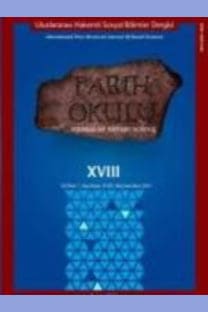TURKISH DISCOUSE PARTICLES 'İŞTE' AND 'FALAN' AND THEIR ENGLISH EQUIVALENTS 'WELL' AND 'LIKE': A CORPUS STUDY
Konuşma İngilizcesinde well ve like'ın söylem belirleyiciler olarak kullanılmasının farklı işlevlerine dair bir çok araştırma bulunmaktadır. Türkçede ise işte ve falan sözcüklerinin yaygın bir şekilde ve benzer işlevlerle kullanıldığı görülmekle birlikle işte hakkında yapılan araştırmaların yetersizliği, falan hakkında da İngilizcedeki söylem belirleyicilerle ilgili araştırmalara benzer çalışmaların olmaması göze çarpmaktadır. Bu bağlamda mevcut çalışma, adı geçen Türkçe ve İngilizce söylem belirleyicileri karşılaştırmalı dilbilim temelinde ele alarak, iki dildeki sözlü derlemlerden örnekler vermek yoluyla bu sözcüklerin çeşitli durumlardaki benzer işlevlerine dikkat çekmeyi amaçlamaktadır. Türkçe diline ait örnekler, Google'da yer alan farklı forum ve blog sitelerinden toplanmıştır. İngilizce diline ait örnekler için ise Google'a ek olarak 'Günümüz Amerikan İngilizcesi Derlemi' (Corpus of Contemporary American English - kısaca COCA) kullanılmıştır. Elde edilen bulgulara göre, Türkçede işte sözcüğü bir çok durumda söylem belirleyici olarak kullanılmakta ve bu kullanımlardan büyük bir kısmı İngilizce well sözcüğü ile aynı işleve sahiptir. Benzer bir durumun, Türkçe falan ve İngilizce like sözcükleri için de geçerli olduğu görülmektedir. Bununla birlikte daha detaylı çözümlemeler sonucunda bu sözcüklerin Türkçe ve İngilizce dillerindeki işlevlerinin birebir aynı olmadığı belirlenerek iki dildeki kullanımlara ait farklılıklar örnekleriyle ortaya konulmuş ve tartışılmıştır.
Numerous studies have investigated the functions of discourse particles well and like in spoken discourse. Their Turkish equivalents, işte and falan are among the most commonly used discourse particles in Turkish. However, there are relatively few studies on işte, and no studies at all on the use of falan as discourse particles. The purpose of this study is to draw attention to the importance of these discourse particles by drawing attention to their various functions in informal discourse. To these ends, authentic data about Turkish discourse have been collected through forum and blog sites on Google; the data regarding the English discourse, on the other hand, were obtained both from Google and also the Corpus of Contemporary American English (COCA). An analysis of the data revealed that işte has a variety of functions as a discourse particle in Turkish; and many of these functions show similarities to the functions of well in English. In a similar way, an analysis of the example sentences containing falan has revealed a strong resemblance between this Turkish discourse particle and the discourse particle like in English. On the other hand, further analysis of the aforementioned corresponding words revealed differences in terms of their usages and functions. Throughout this paper similarities and differences between Turkish discourse particles işte and falan and their English equivalents well and like are explained in a contrastive way with numerous examples from each of the languages under investigation.
___
Aijmer, K. & Simon-Vandenbergen, A.-M. (2003). The discourse particle well and its equivalents in Swedish and Dutch. Linguistics, 41(6), 1123-61.Andersen, G. (2001). Pragmatic markers and sociolinguistic variation: a relevance-theoretic approach to the language of adolescents. Amsterdam: John Benjamin.
Corpus of Comtemporary American English (COCA 1990-2008). http://www.americancorpus.org/
Cuenca, M. (2008). Pragmatic markers in contrast: the case of well. Journal of Pragmatics 40: 1373-1391.
Dailey-O'Cain, J. (2000). The sociolinguistic distribution of and attitudes toward focuser like and quotative like. Journal of Sociolinguistics, 4, 60-80.
falan. (n.d.) TDK Büyük Sözlük Retrieved December 12, 2008, from http://tdkterim.gov.tr/bts/?kategori=veritbn&kelimesec=285319
Fox Tree, J. E. (2006). Placing like in telling stories. Discourse Studies, 8, 723-743.
Fox Tree, J. E. & Tomlinson, J. M., Jr. (2008). The rise of like in spontaneous quotations. Discourse Processes, 45, 85-102.
Furman R. & Özyürek, A. (2007). Development of interactional discourse markers: insights from Turkish children's and adults' oral narratives. Journal of Pragmatics, 39, 1742-1757.
Miller, J. & Weinert R. (1995). The function of like in dialogue. Journal of Pragmatics, 23, 365-393.
Müller, S. (2004) 'Well you know the type of person': functions of 'well' in the speech of American and German students. Journal of Pragmatics, 36, 1157-1182.
Özbek, N. (1998). 'yani, İşte, şey, ya: Interactional markers of Turkish'. Proceedings of the Ninth Interactional Conference on Turkish Linguistics, August 12-14, Lincoln College, Oxford.
Romaine, S. & Lange, D. (1991). The use of like as a marker of reported speech and thought: a case of grammaticalization in progress. American Speech, 63, 227-279.
Schourup, L. C. (1985). Common discourse particles in English conversation. New York: Garland Publishing, Inc.
Siegel, M.E.A. (2002). Like: the discourse particle and semantics. Journal of Semantics 19, 35-71.
Underhill, R. (1988). Like is, like, focus. American Speech 63, 234-246.
Yılmaz, E. (2004). A pragmatic analysis of Turkish discourse particles: yani, işte and şey. Unpublished PhD Thesis, METU, Ankara.
- ISSN: 1308-5298
- Başlangıç: 2008
- Yayıncı: Ahmet KARA
Sayıdaki Diğer Makaleler
Orta Çağ'da Kumanlar ve Macarlar,
TÜRKÇE EĞİTİMİ BÖLÜMÜ ÖĞRENCİLERİNİN İMLA KURALLARINI UYGULAMA BECERİLERİ ÜZERİNE DEĞERLENDİRME
BATTAL GAZİ DESTANI'NDA DİNÎ UNSURLAR ÜZERİNE BİR DEĞERLENDİRME
OSMANLI BORÇLARININ ÇÖZÜM SÜRECİ ÜZERİNE İKTİSADİ POLİTİK BİR DEĞERLENDİRME (1928-1933)
KARADENİZ'DE OSMANLI HÂKİMİYETİ VE RUSYA'NIN SICAK DENİZLERE İNME MÜCADELESİ
MA'LÛMÂT-İ İBTİDÂİYYE VE NESÂYİH-İ NÂFİA KİTABININ ÇEŞİTLİ AÇILARDAN İNCELENMESİ
Hüseyin ÖZÇAKMAK, Kemal Zeki ZORBAZ
OSMANLI MİDİLLİSİ'NDEKİ ŞAHIS VAKIFLARININ AMAÇLARINA DAİR
